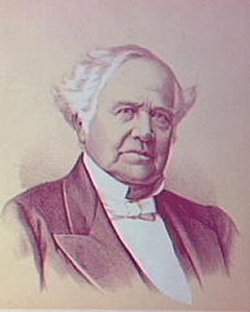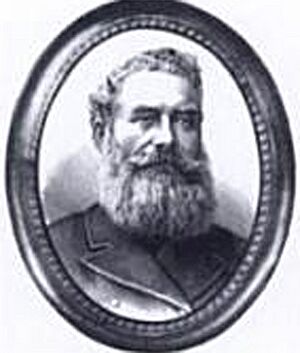Cranbrook, Bellevue Hill facts for kids
Quick facts for kids Cranbrook |
|
|---|---|
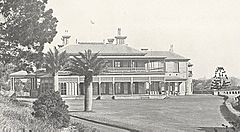
Cranbrook, Sydney, 1917
|
|
| Former names | Cranbrook Cottage |
| General information | |
| Status | Complete |
| Type | Mansion |
| Coordinates | 33°52′22″S 151°15′02″E / 33.87271°S 151.25043°E |
| Construction started | 1859 |
| Renovated | 1873-74 |
| Client | Robert Tooth |
| Owner | Cranbrook School, Sydney |
| Design and construction | |
| Architect | John Horbury Hunt (extensive renovations in 1873-4) |
| Known for | Official residence of Governor of New South Wales and Governor-General of Australia (1901-1917) |
Cranbrook is a large house located in Rose Bay, Sydney, Australia. It was built in 1859 as a private home. For a time, it served as an official residence for important government leaders like the Governor of New South Wales and the Governor-General of Australia. Today, Cranbrook is part of Cranbrook School.
Contents
A Grand Private Home
Who Built Cranbrook?
The Cranbrook house was built in 1859 by Robert Tooth (1821–1893). He was part of the famous Tooth's Brewery family in Sydney. Robert named the house after a village in Kent, England, where his family came from. His brother, Frederick, built his own house called "Buckhurst" on land next door.
Robert Towns Takes Over
In 1864, Robert Tooth sold Cranbrook to Robert Towns. Towns was a very successful businessman in Sydney. He owned a shipping company and even founded the city of Townsville, Queensland. He was also a member of the New South Wales Parliament. When Robert Towns passed away in 1873, Cranbrook was sold again.
James White's Era
James White bought Cranbrook in 1873. He was a wealthy landowner and loved racehorses. White hired John Horbury Hunt, a well-known architect, to make big changes and additions to the house.
James White and his wife, Emily, filled Cranbrook with amazing art. They had valuable china and paintings by famous Italian, German, and English artists. A description from that time said the house had "many costly art treasures."
These treasures included rare china from places like Dresden and Sevres. The drawing room even had a large ivory carving of a female figure.
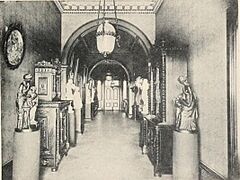 |
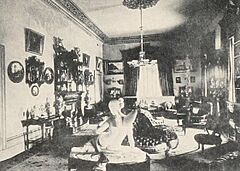 |
| The Hall in Cranbrook, 1895. | The drawing room in Cranbrook, 1895. |
One of James White's biggest passions was horseracing. After buying Cranbrook, he also bought a property called Kirkham to start his own horse stud farm. John Horbury Hunt, the architect, also designed buildings for White at Kirkham.
Cranbrook Cottage
Horbury Hunt also built a stone house called Cranbrook Cottage on White's land. When Cranbrook was put up for sale in 1898, the cottage was described as a separate property. It was noted that Horbury Hunt himself was living there at the time. He later bought the cottage and sold it in 1902.
The Beautiful Gardens
While James and Emily White owned Cranbrook, they also improved the gardens. Horbury Hunt built a tennis pavilion, which is now known as the Rotunda at Cranbrook School.
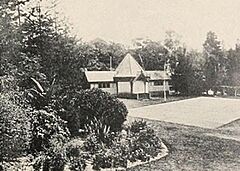 |
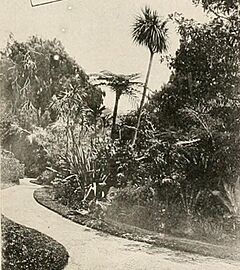 |
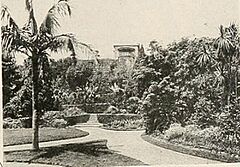 |
| The tennis pavilion at Cranbrook, 1895. It is now the Rotunda at Cranbrook School. | The grounds at Cranbrook, 1895. | The garden at Cranbrook, 1895. |
People at the time admired the gardens. One report mentioned a lovely terrace that blocked out the road. It also noted that the gardens were always full of beautiful flowers, thanks to well-kept greenhouses. The view from the water side was described as "charming."
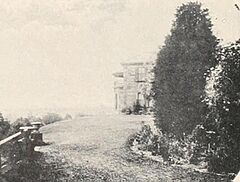 |
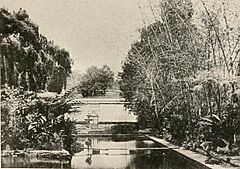 |
| The terrace on the side of the house at Cranbrook, 1895. | The pond at Cranbrook, 1895. |
James White passed away at Cranbrook in 1890. Since he and Emily had no children, Emily inherited the house. Six years later, in 1896, Emily married Captain William Scott. Sadly, Emily died shortly after they traveled to Scotland. Captain Scott inherited her properties, but he put Cranbrook up for sale in 1898.
Cranbrook Becomes a School
In 1917, the government of New South Wales decided to sell Cranbrook at an auction. Samuel Hordern bought the property on behalf of a group of men from the Church of England. They wanted to use the grand house as a school. In July 1918, Cranbrook School officially opened its doors. It is still a school today.
Images for kids
 | May Edward Chinn |
 | Rebecca Cole |
 | Alexa Canady |
 | Dorothy Lavinia Brown |


